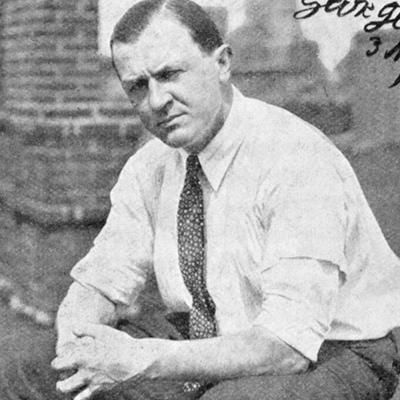Utilizziamo i cookie per rendere migliore la tua esperienza di navigazione. Per rispettare la nuova direttiva sulla privacy, è necessario chiedere il tuo consenso per impostare i cookie. Per saperne di più.
Georges Grosz

George Grosz (July 26, 1893 – July 6, 1959) was a prominent member of the Berlin Dada and New Objectivity group, known especially for his savagely caricatural drawings of Berlin life in the 1920s. George Grosz was born Georg Ehrenfried Groß in Berlin, Germany, but changed his name in 1916 out of a romantic enthusiasm for America that originated in his early reading of the books of James Fenimore Cooper, Bret Harte and Karl May. His artist friend and collaborator Helmut Herzfeld changed his name to John Heartfield at the same time. In 1914, Grosz volunteered for military service; like many other artists, he embraced World War I as "the war to end all wars", but he was quickly disillusioned and was given a discharge after hospitalization in 1915. In May 1917, he was discharged as permanently unfit. Grosz was arrested during the Spartakus uprising in January 1919, but escaped using fake identification documents; he joined the Communist Party of Germany (KPD) in the same year. In 1921, Grosz was accused of insulting the army, which resulted in the destruction of the collection Gott mit uns ("God with us"), a satire on German society. Grosz left the KPD in 1922 after having spent five months in Russia and meeting Lenin and Trotsky, because of his antagonism to any form of dictatorial authority.
In his drawings, usually in pen and watercolor, Grosz reproduced Berlin and the Weimar Republic in the 1920s. Corpulent businessmen, wounded soldiers, prostitutes, sex crimes and orgies were his main subjects. His draftsmanship was excellent although the works he is well-known for adopt a deliberately crude form of caricature. His oeuvre includes a few absurdist works, such as Remember Uncle August the Happy Inventor. Bitterly anti-Nazi, Grosz left Germany in 1932 and was invited to teach at the Art Students League of New York in 1933, where he taught intermittently until 1955. He became a naturalized citizen of the United States in 1938. Although a softening of his style had been apparent since the late 1920s, Grosz's work turned toward a sentimental romanticism in America, a change generally seen as a decline. He continued to exhibit regularly. In 1946, he published his autobiography, A Little Yes and a Big No. Even though he obtained the American citizenship, he went back to Berlin in 1959 where he died on 6 July 1959 by falling down from a flight of stairs after a night of drinking. In 1960, Grosz was the subject of the Oscar-nominated short film George Grosz' Interregnum.

Validate your login